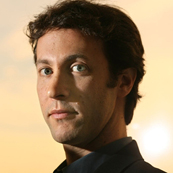“If the conscious mind—the part you consider you—accounts for only a fraction of the brain’s function, what is all the rest doing?” This is the question that neuroscientist David Eagleman, Ph.D., the next Distinguished Speakers Series guest, has spent years researching. Hosted by the Farquhar College of Arts and Sciences Division of Math, Science, and Technology, Eagleman will speak on campus about his work.
Distinguished Speakers Series
David Eagleman, Ph.D. | “Incognito: The Secret Lives of the Brain”

Thursday, Apr. 19
7:00 p.m.
Miniaci Performing Arts Center
A Guggenheim Fellow, Eagleman directs the Laboratory for Perception and Action and the Initiative on Neuroscience and Law at Baylor College of Medicine. He is best known for his work on time perception, synesthesia, and neurolaw.
Eagleman is also a New York Times bestselling author. His latest book, Incognito: The Secret Lives of the Brain (2011), explores the neuroscience “under the hood” of the conscious mind—that is, all the aspects of neural function of which we have no awareness nor access. Eagleman also penned the fiction book SUM: Forty Tales from the Afterlives, an international bestseller published in 23 languages. Why the Net Matters, Eagleman’s book on the Internet and civilization, is available as an iPad app and as an e-book.
Tickets
This Distinguished Speakers Series event is free to attend, but tickets are required. Beginning Monday, Apr. 2, tickets will be available to Farquhar College of Arts and Sciences students, faculty, and staff members. On Monday, Apr. 9, tickets will become available to all NSU students, faculty, and staff members. Pick up tickets in the college’s Office of the Dean, located in the Mailman-Hollywood Building, second floor. Limit two (2) tickets per person. An NSU ID is required to obtain tickets.


David Eagleman promotes the false notion that recent research has discovered the conscious mind which we think of as our ‘self’, is actually only one of many quite independent minds that operate in our brains, and that these distinct minds with unique characteristics and functions contribute thoughts to the managing mind which ultimately decides how to process the input of these minds.
In fact that understanding of how the mind works is ancient knowledge. Eagleman naively promulgates the notion as if it were novel discovery of modern science, when in fact it is really nothing new to thousands who have studied the psychological work of George Gurdjieff, a sufi mystic, psychologist, and philosopher who died in 1949.
Eagleman should give proper academic credit to those who have done previous theorizing, experiments, research, and demonstrations of this phenomena for more than a hundred years, and quite likely for many centuries.